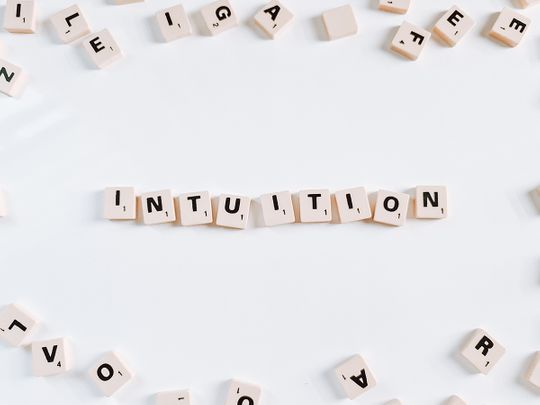
When both French designer Coco Chanel and German-born theoretical physicist Albert Einstein were asked what was the source of their genius, they had the same answer: Their intuition.
Click start to play today’s Spell It, where we learn how to stop overthinking and to ‘intuit’ along the way.
Einstein was reported to have told the US-based Saturday Evening Post in 1929: “I believe in intuitions and inspirations. I sometimes feel that I am right. I do not know that I am.” Likewise, Chanel’s strategy, which she shared in 1920, according to British Vogue, was based on a similar feeling. She once said: “Fashion is not simply a matter of clothes. Fashion is in the air, born upon the wind. One intuits it. It is in the sky and on the road.”
In the age of big data, trusting your gut often gets a bad reputation. But whether in science or art, it can prove incredibly useful, especially when paired with some rational analysis. An April 2016 study in the US-based journal Psychological Science showed that combining intuition with analytical thinking helps people make better, faster and more accurate decisions. It also gives you more confidence in your decisions than relying on intellect alone.
It's why the US Navy has invested millions in helping sailors and Marines hone their sixth sense, according to an April 2017 report in US-based TIME magazine. The notion is that intuition can even surpass intellect in the heat of battle.
So, how do you hone your gut instinct? Since intuition is like a muscle, you can train it through self-awareness and practice. Here are some ways to strengthen your intuition, according to a March 2022 report in US-based business news website Harvard Business Review:
1. Differentiate gut feeling from fear
When you’re afraid, you tend to feel panicked, tense, or desperate. The sensation is that of constriction and fear has a sort of pushing energy, as if you’re being compelled to select an option in order to avoid a threat, rejection or punishment. On the other hand, intuition has a pulling energy, and is accompanied by feelings of anticipation, ease and excitement. You feel physically relaxed, and your inner voice appears more centred and grounded. Knowing this difference will help you understand whether you’re listening to your fear or your gut.
2. Begin with minor decisions
Start with taking quick, decisive actions that have have minimal onsequences, but still gives you the opportunity to become comfortable using your intuition. For instance, you could choose an outfit that seems appealing, without thinking too much about it. Or you could speak at a meeting without censoring yourself. Start small and gradually step up to decisions with higher pressure, that require greater self-trust. This approach builds your distress tolerance – the ability to regulate emotionally in the face of discomfort.
3. Try the snap judgment test
Relying on quick thinking or ‘thin-slicing’, in psychological terms, can help your brain make decisions without overthinking, and hone your sense of intuition. Try the snap judgment test by writing a question on a piece of paper, such as, “Should I buy a new car?” Then list ‘yes’ and ‘no’ beneath the question and leave a pen nearby. After a few hours, return to the paper and immediately circle the answer that appeals to you. It may not be an answer you like, but there’s a good chance you responded honestly.
Do you think you’re an intuitive person? Play today’s Spell It and tell us at games@gulfnews.com.









